Electric cars in Indian traffic
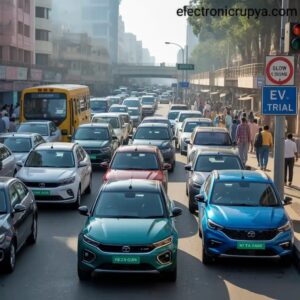

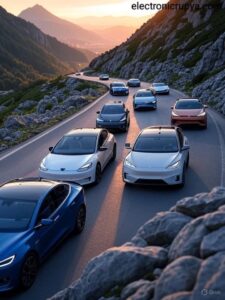
Electric cars are becoming increasingly popular in India as people look for eco-friendly and cost-effective alternatives to petrol and diesel vehicles. However, with the rise in electric vehicle (EV)
adoption, a crucial question arises: Are electric cars in Indian traffic safe conditions?
India’s roads are known for heavy traffic, poor road conditions, reckless driving, and frequent accidents. In such an environment, the safety of any vehicle—electric or conventional—is a major concern. Let’s explore how safe electric cars really are in Indian traffic.
1. Structural Safety of Electric Cars
Stronger Build & Lower Center of Gravity
Most electric cars have a sturdy build because their batteries are placed at the
bottom of the vehicle. This design gives them a low center of gravity, reducing
the risk of rollovers—a common issue with taller SUVs on Indian roads
No Combustible Fuel = Lower Fire Risk?
Unlike petrol or diesel cars, EVs don’t carry flammable fuel. However, their lithium-ion batteries can catch fire if damaged or overheated. While such incidents are rare, they have happened in India (like the Nexon EV fire case in 2022). Manufacturers are now improving battery cooling systems and using better materials to prevent such risks.
Crash Safety Ratings
Many electric cars, like the Tata Nexon EV and MG ZS EV, have received 4 or 5-
star safety ratings in crash tests, meaning they offer strong protection in collisions. However, not all EVs are equally safe—cheaper models may compromise on safety features.
2. Safety Features in Electric Cars
Modern electric cars come with advanced safety features, some of which are even better than those in traditional cars:
Regenerative Braking: Helps in better control while braking, especially in
stop-and-go traffic.
Multiple Airbags & Strong Body Structure: Protects passengers in case
of a crash.
Stability Control & ABS: Prevents skidding on wet or uneven roads.
Battery Protection: Many EVs have reinforced battery casings to prevent
damage in accidents.
However, not all EVs in India have these features, especially budget models.
Buyers must check safety ratings before purchasing
3. Challenges Electric cars in Indian Traffic Conditions
Poor Road Conditions & Potholes
Indian roads are infamous for potholes and uneven surfaces. Since EV batteries
are placed underneath, hitting a deep pothole at high speed could damage
the battery, leading to safety risks. Manufacturers are working on better
ground clearance and battery protection, but drivers must still be cautious.
Chaotic Traffic & Reckless Driving
With constant lane-cutting, sudden braking, and two-wheelers zigzagging
through traffic, EVs need strong braking systems and quick acceleration control. Fortunately, most EVs have instant torque, allowing quick acceleration when needed, but drivers must adapt to the different driving feel compared to petrol cars.
Lack of Emergency Response for EV Fires
In case of an EV fire, traditional methods (like water) may not work effectively.
India is still developing specialized firefighting techniques for EV battery fires, which can take longer to extinguish.
4. Are Electric Cars in Indian traffic Safer Than Petrol/Diesel Cars?
Advantages Over Conventional Cars:
No fuel combustion: No risk of fuel leaks or explosions.
Lower maintenance: Fewer moving parts mean fewer mechanical failures.
Advanced safety tech: Many EVs come with better safety features than
similarly priced petrol cars.
Disadvantages & Risks:
Battery fires: Though rare, they are harder to control.
High repair costs: Damaged batteries can be expensive to replace.
Silent operation: Pedestrians may not hear EVs coming, increasing accident
risks.
5. How Can EV Owners Stay Safe?
Choose a High-Safety Rated EV: Always check Global NCAP or Bharat
NCAP ratings before buying.
Drive Carefully: EVs accelerate faster—avoid sudden speed bursts in traffic.
Avoid Waterlogged Roads: Submerged batteries can short-circuit.
Regular Maintenance: Ensure battery health is monitored by authorized
service centers.
Final Verdict: Are EVs Safe for India?
Yes, electric cars in Indian traffic can be safe—if you choose the right model
and drive responsibly. High-quality EVs with strong safety ratings perform well
even in tough conditions. However, India still needs better EV-specific emergency response systems and improved road infrastructure to maximize safety.
As technology improves, electric cars will only get safer. For now, buyers should
prioritize safety features over cost savings to ensure a secure driving experience on India’s unpredictable roads.
Conclusion:
Are Electric Cars in Indian traffic safe?
Electric cars are undoubtedly the future of mobility in India, offering eco-friendly benefits, lower running costs, and advanced technology. However,
their safety in India’s unpredictable traffic conditions depends on several factors:

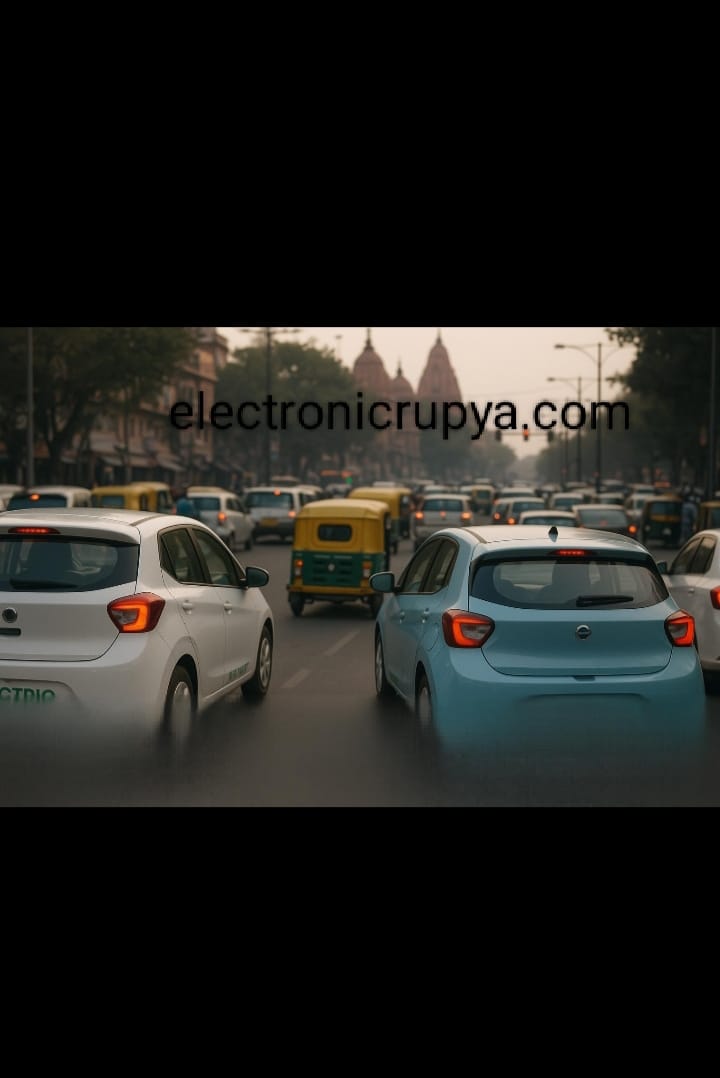

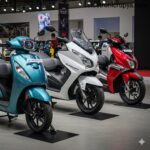


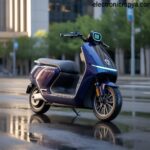
2 thoughts on “How Safe are Electric Cars in Indian Traffic Conditions-2025?”